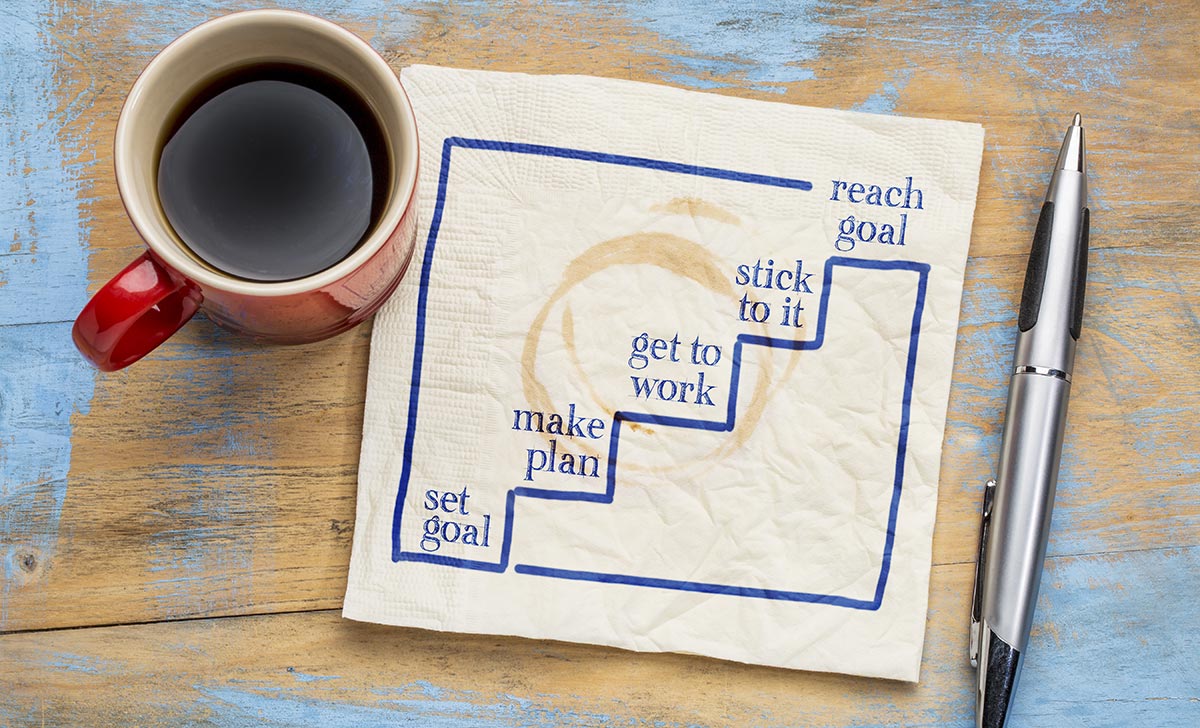Third of Six New Year’s Resolutions that will Change Your Life
The significance of a man is not in what he attains but in what he longs to attain.
— Kahlil Gibran
 I love starting a new year. It’s a huge marker that motivates me to set goals. Each year in December, I review the past year in comparison with the goals I set up at the beginning of the year.
I love starting a new year. It’s a huge marker that motivates me to set goals. Each year in December, I review the past year in comparison with the goals I set up at the beginning of the year.
If I write my goals down and put dates as to when I want to accomplish them, and then go back and review, I find that most of them actually get accomplished. This is not to say that I’m a super regimented person… far from it. All you have to do is ask Richard about that.
However, goal setting allows me to have a direction and something to aspire to. And it works!
Surprisingly, many major gift officers with whom I’ve worked often don’t have goals – neither caseload, professional nor personal.
This is tragic.
This year I want to implore you to set goals. This isn’t something to be feared, although at first it may feel scary. Setting goals will help keep you accountable and focused. It will also help you to understand the progress you’re making over time.
Caseload Goals
You have to create goals for your caseload in 2020. Now, if your fiscal year is the calendar year, that’s great and you can start fresh. However, if your fiscal year begins in another month, you’ll need to go back and start from the beginning of the fiscal year – for some of you that could mean going back six months. You’ll need to factor in what each of your donors gave to date, and then what they’re capable of giving over the next six months.
For each person on your caseload, you should review their past giving behavior. Look at when they gave, along with a clear understanding of who they are and what they’re capable of. Assign a number that you feel can be obtained by that donor.
Yes, every one of them.
Now, for some MGOs this is a no-brainer. Great. But for many of you, this is actually a new concept. In 2020 this is no longer going to be a concept, but a reality. Creating caseload goals will help you become a better, more disciplined MGO. You now have something you can measure against. You need this to stay focused throughout the year.
If you’re worried that setting individual donor goals boxes you in… you’re right. You need to be. Get to your goal, and then break through the box.
Professional Goals
You don’t have to be a “Type A” person to set professional goals. You know what I mean: those folks who were multi-tasking as soon as they were born… rattle in one hand, juice in the other and using their feet to move around in their stroller. No, setting professional goals is not just for those people.
You need to ask yourself some questions this week and the next:
- What kind of person do I want to be in my job this coming year?
- Where do I want to be in my career next year at this time?
- How does my job look different next year?
- Where do I want to be with my salary next year?
- Where do I need to be quarterly in order to make my yearly overall revenue goal?
- What kind of influence do I want to have in my workplace by next year?
These are some of the questions you want to ask yourself. And I’m sure there are many others. The point here is that setting professional goals helps give you the needed motivation to create a plan to achieve those goals.
For example, if one of your goals is to be a Senior Major Gift Officer at your organization, you’ll create the necessary strategy and action steps throughout the year in order to obtain that position. It might include a 20% increase in revenue from your caseload, taking on more responsibility, receiving great feedback from your donors and an incredibly positive review from your supervisor.
Figure out what you want, then decide what it’s going to take to obtain it, and work a plan to achieve it.
That is the beauty of setting goals.
Personal Goals
“Jeff, aren’t you getting a little personal here?” Ha! Yes, I am. Look, if you’re going to set caseload goals and professional goals, why not take a look at your life and set some personal goals as well?
All of us have something we can work on. It could be as mundane as setting a goal of reading 10 books this year or as profound as deepening a relationship. Goals aren’t just for work.
I have to admit, I was not a great personal goal setter… until I started setting goals for work and seeing the power those goals had on my career. I’m not talking about coming up with a list of 20 things that are going to be impossible to achieve.
But perhaps there are 2 or 3 that you could accomplish and work on – 2 or 3 that could possibly change your life.
Finally, about this goal-setting stuff: you can’t keep them to yourself. You have to share it with someone. Whether it’s your boss, your spouse or a friend – goals are only powerful when you can share them and can be held accountable to them.
“Do I have to?” YES! The power of goal-setting is when they’re shared with others. Hey, I didn’t say this was going to be easy. And you know that nothing easy is worth doing anyway.
Okay, you can do this! Start setting goals for 2020, put a plan to it and then share those goals with someone to keep you accountable. (Tweet it!)
Then, next year at this time, I want you to write about your experience and what it did for you in 2020.
Jeff
Read the whole series, Six New Year’s Resolutions that will Change Your Life:
New Year’s Resolution #1: Resolve to Serve Your Donor, Don’t Sell Them
New Year’s Resolution #2: Resolve to Love Your Work!
New Year’s Resolution #3: Resolve to Set Goals! (This post)
New Year’s Resolution #4: Resolve to Make Mistakes
New Year’s Resolution #5: Resolve to be More Curious – Ask More Questions
New Year’s Resolution #6: Resolve to Seek Joy!
This post was originally published as we began 2012.







0 Comments